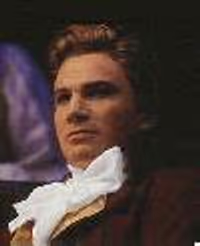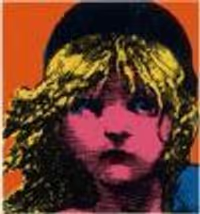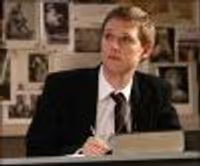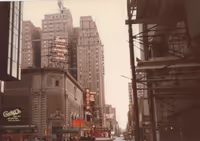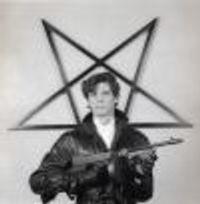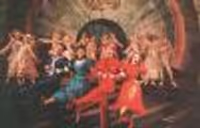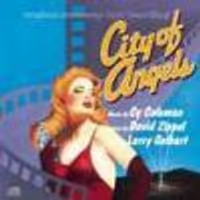John Doyle is at it again!
#75John Doyle is at it again!
Posted: 8/11/11 at 1:03am
One-Trick-Pony (noun)- A person or thing with only one special feature, talent, or area of expertise
As has been mentioned MANY times Doyle has more than one feature, talent and area of expertise. In no way is he a one trick pony. Is he getting work in one style more than others, sure, but he has proven that he can work in multiple styles.
#76John Doyle is at it again!
Posted: 8/11/11 at 1:35am
Fire Diane Paulus, and hire John Doyle to direct Porgy and Bess.
He can strap a xylophonbe to Porgy's donkey cart, and let Bess mouth an oboe while she sings.
#77John Doyle is at it again!
Posted: 8/11/11 at 2:09am
>> Is he getting work in one style more than others, sure, but he has proven that he can work in multiple styles.
The question is: what is he best known for?
Actor/musician productions. Those are his signatures: even the theatre company linked here says it. Yes, he's done others, but it's becoming increasingly obvious that this is what he likes to do, and he will make it work with the play, by force if necessary.
No, I think the label applies. He's simply done it too many times now. It would be like me designing half my projects in black and white and nothing else. Maybe a b/w approach would work, sure, but after a while, people would be saying, "Oh yeah, Martin: the guy that designs everything in black and white."
#78John Doyle is at it again!
Posted: 8/11/11 at 11:35am
I wonder when people will see the true function behind this actor/musician nonsense lies in undermining music and musicians for the sake of saving a few bucks and making a couple more?
I will never be convinced that it's a legitimate artistic application. It's a stealthy move towards eradication of the live orchestra that begins with denying 20 musicians possible jobs, butchering the orchestrations and calling them "updated" when they've merely been reduced and slimmed to practically nothing, and shoving a handful of instruments that now double as props and personalities on the actors' laps, when musicians should be providing the music as intended by the composer and orchestrator that is so integral to and a unique aspect of the live musical.
The actors should be doing their thing without taking a musician's job. I don't want to see what is essentially multitasking double as a supposedly groundbreaking concept on Broadway.
I want the standard 20 piece with human musicians playing a score as orchestrated, not compromised and reduced to a flute and fiddle played by an actor who should be acting not fumbling with an instrument/prop/supposed personality!
#79John Doyle is at it again!
Posted: 8/11/11 at 11:56am...actually, Doyle has been quoted as saying that the whole initial reason for the actor/musician thing was to save money.
#80John Doyle is at it again!
Posted: 8/11/11 at 12:11pmMy Oh My- The problem is that almost every producer out there will never give you the full orchestra. Thinking of the Sweeney revival (musically, not in terms of performances), I would prefer the actor-musician revival where we got something interesting musically to one that only uses a handful of instruments in the pit, such as the Circle in the Square revival where the music suffered.
#81John Doyle is at it again!
Posted: 8/11/11 at 12:19pmI actually liked the SWEENEY... well, except for Patti and her flugelhorn. But COMPANY did absolutely nothing for me. The big moment was waiting for him to sit at the piano and play something. Big whoop. It was cheezing out, IMHO.
#82John Doyle is at it again!
Posted: 8/11/11 at 12:24pm
I thought parts of Company were brilliant, and parts were just good (nothing sucked, in my opinion). What made that show be one of the most powerful things I've ever seen was Raul's performance, it completely blew me away. In fact, I'd say all of the performers were so strong in that show that they made the actor-musician concept work, though it wasn't as seamless as Sweeney.
And re: Patti's tuba- If Patti's Lovett was going to play an instrument it would be a tuba. It was the perfect choice for her take on the character.
#83John Doyle is at it again!
Posted: 8/11/11 at 12:25pmI recently saw Doyle's production of Road Show at the Menier. No gimmicks (save what the space almost demands), just a very well-directed show.
#84John Doyle is at it again!
Posted: 8/12/11 at 1:34amI think he has a beautiful eye for design and interesting direction. I'd actually like to see him take on a straight play and see what happens.
#85John Doyle is at it again!
Posted: 8/12/11 at 3:39amI thought the design for Sweeney was pretty astounding, very atmospheric and tactile, and the reduced orchestrations were also pretty nice (they lacked the sheer power of Tunick's original mammoth arrangements but were imaginative and moody), but I couldn't stand his Company. It was so stiflingly, sullenly somber and the reduced orchestrations hit me as being sort of absurd-sounding. I have cautious optimism for this production; it being a revue (apparently) takes some of the load off of the conceit of characters carrying instruments around, though its inhibition of dance seems dangerous.
#86John Doyle is at it again!
Posted: 8/12/11 at 12:03pmI think he has great design ideas that don't work well in a standard Broadway theater. Sweeny was intended for a thrust stage, so some of the stage pictures, etc. were a little awkward. As was Company. It was weird to have that big pole in the middle of the set.
#87John Doyle is at it again!
Posted: 8/12/11 at 7:24pmJohn created his style of musical for back of beyond regional theatre here in the UK that could never afford to stage a full blown pit orchestra show..what he put on stage made a small audience very happy..producers caught on to this and found a way to make a lot of money...tiny casts..no band...low overheads..cash in the bank. Producers hire him because he makes them money. He'd be delighted if a producer gave him a full pit orchestra. I've stage managed 2 operas here in the UK for him and he's one of a very few directors who really does his homework, tells the story and gets the show on with no cancelled previews.
#88John Doyle is at it again!
Posted: 8/13/11 at 3:13pm
I think he has a beautiful eye for design and interesting direction. I'd actually like to see him take on a straight play and see what happens.
He directed Wings at Second Stage last year (starring Jan Maxwell). She was brilliant, but the direction was...odd.
#89John Doyle is at it again!
Posted: 8/13/11 at 3:58pmHis production of MAHAGONNY would have been interesting if he tried out the actor/musician shtick on it. But I guess it was fine on its own.
#90John Doyle is at it again!
Posted: 8/13/11 at 11:37pm@ History Boy, I'm curious how the Road Show you saw at the Menier compared to Doyle's production of it last year Off-Broadway. Physically the set consisted of one brass bed and a wall of stacked crates and file cabinets. Key props and furniture pieces (and a few actor entrances) came out of the crates. An elegant start to the night that got old pretty quickly. Otherwise, Doyle provided nearly a concert reading of the show, punctuated by snorts of white powder and endless stacks of dollars being flung about the stage over and over again. I still can't tell if there's a there there with Road Show because I don't feel we've seen a proper production yet. Your take?
#91John Doyle is at it again!
Posted: 8/14/11 at 2:19pm
Your description sounds basically like what's playing in London. The difference is the venue.
The Menier Chocolate Factory is quite small and has no stage per se. The show is being played in the midst of the audience between two long banks of seats - I believe it's called a traverse staging - and feels very intimate and very fluid. Personally I found the staging perfect for Road Show. I loved every second of it.
#92John Doyle is at it again!
Posted: 8/15/11 at 6:55pm
Brantley's rave:
http://theater.nytimes.com/2011/08/16/theater/reviews/ten-cents-a-dance-at-williamstown-theater-festival-review.html?hpw
Videos


